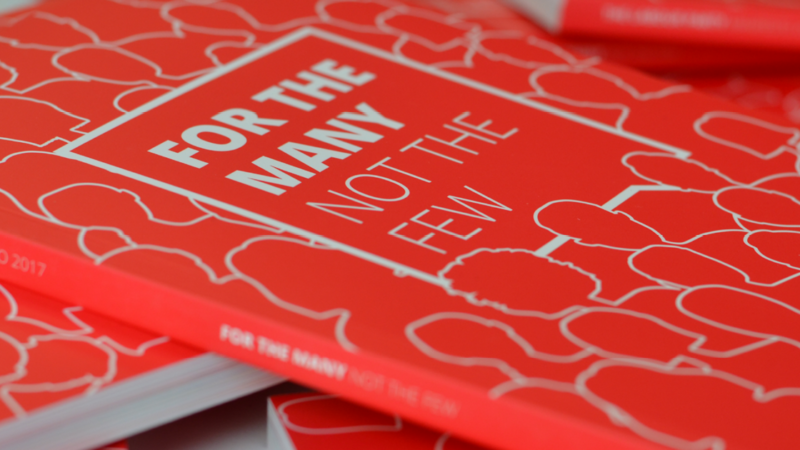
When I set out to write this week’s column, I was planning to discuss the launch of Forward Momentum – a new grassroots initiative set up to push for democratic reforms within Momentum. Since we lost the election, and the left lost the party leadership, I’ve been reflecting on institution-building and organising within the left, both its failures and successes in the last few years. But when the Labour Party’s leaked dossier appeared on Twitter, it became clear that the discussion of the purpose and culture of our institutions must be a much wider one.
The question of what kind of institutions we build – whether that is Momentum or the Labour Party – is important. Momentum’s biggest failure, in my view, has always been the inability to articulate a political basis from which a strategic goal could be derived. With the Labour Party, one would assume that all members share at least one goal: a Labour government. But it seems even this low common denominator is not enough of a glue to hold the party together.
The Labour Party is a tool for the labour movement to achieve the strategic objective of winning government through contesting elections. It also aims to carry out political reforms within the parliamentary system. But what are these reforms? What is a Labour government supposed to achieve? Who is it supposed to represent? These are all important political questions, and they go beyond simple matters of HQ staffing. They lead us down a path of reflecting on what kind of organisation we have to be to achieve our aims.
How do we engage with each other and our communities? The answer to this question informs whether the party prioritises resources for political education and community work, to what extent we allow autonomous organising or prefer central control from regional offices. It reflects on who we want to represent us. It determines who we chose to appeal to in our electoral coalition, and which section of society we view as the agitator.
These questions should be the starting point of any political organisation. Without people who are committed to some shared political principles, any veneer of unity will be hard to uphold. Is it possible for us all to coexist within these structures? I don’t believe that the issues we have experienced in institutions of the Labour left will vanish simply by altering some of our structures. For a healthy, functioning organisation, we need to work through our fundamental political contradictions. My hunch is that this will be even harder to achieve for the Labour Party “broad church”. Just “winning elections” was never enough. The contradictions of our politics have been ripping us apart at the seams for a long time.
The leaked report will have caused real and deep-felt hurt for members who poured their hearts and souls into the 2017 and 2019 general elections. They will be shocked to read that according to the report those in charge of the party did not appear to want a Labour government on the political terms set out in 2017. Many of us who have been involved in national and regional party structures will recognise names of people we have worked with and trusted. As a past Young Labour national committee rep, it is upsetting to read what has apparently been said about my former contemporaries.
Many Jewish members will still not have the answers that they are looking for. The publication of the names of those who reported antisemitism will understandably make those affected feel very anxious. And the treatment of Diane Abbott described in the document makes for heart-wrenching reading. Staff sending a TV journalist to humiliate her as she was crying in a public bathroom shames us all. The signals that this and other incidents detailed in the report send to members from a minority ethnic background are disastrous.
Where does this leave us? How can we come back from this collectively? Many of us feel a deep connection to the Labour Party as an institution. Our lives are often intertwined with the party. Many have found a second home here. Some of us have met our closest friends, our partners, through Labour. This is what made the party feel like family. But as the saying for the family unit goes: blood is thicker than water. The intense bonds we can form with our comrades might be a source of strength in the struggle. Equally, it can also mean that misbehaviour will be tolerated and covered up. Perhaps that is why it is both so beautiful and so dangerous to be this emotionally involved. The political is always personal.
If it looks like we cannot care for one another, how can we create a society that is less harsh and punishing? To move forward, we must rediscover a shared political purpose grounded in a vision for a kinder society. But kindness is not just about being nicer to people on Twitter. It’s about a society that prioritises people’s needs over profit accumulation. Members must feel that they have a stake in defining how this can be articulated in a political strategy. We have to be able to trust those working on the behalf of the movement that we will all do our best to achieve our aims. Without this common purpose that binds us together, it will be hard to imagine how we can relate to each other in a healthy, supportive way or win an election.
It seems easy to fall into a cynical mindset after everything we have collectively been through. But as the world around us feels darker and more atomised in the current crisis, we must hold on to a belief that a different world is still possible and people can be fundamentally good.




More from LabourList
‘Energy efficiency changes must work for older private renters’
‘Labour’s creative destruction dilemma’
Economic stability for an uncertain world: Spring Statement 2026